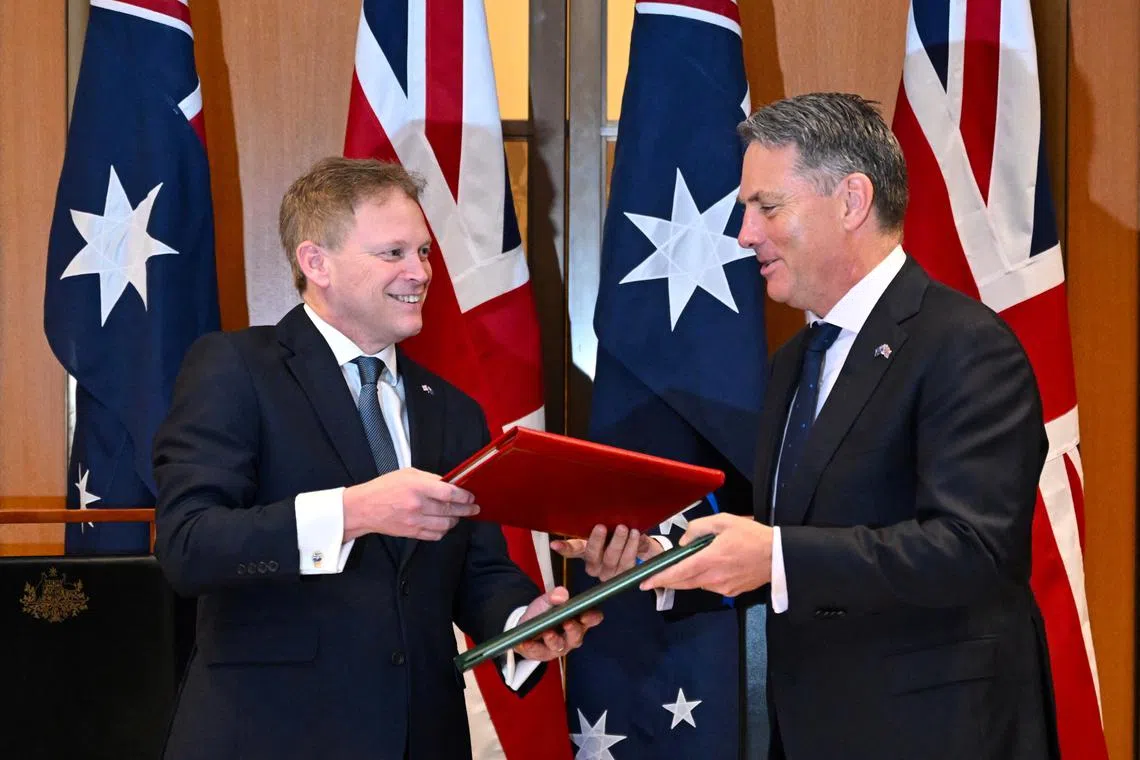Britain and Australia sign new defence pact
Sign up now: Get insights on Asia's fast-moving developments

British defence minister Grant Shapps (left) and his Australian counterpart Richard Marles exchange defence treaty documents at a meeting at Parliament House in Canberra, on March 21.
PHOTO: REUTERS
SYDNEY - Britain and Australia inked a new defence agreement in Canberra on March 21, as they try to boost a fledgling nuclear-powered submarine programme with the United States.
British Defence Secretary Grant Shapps signed the agreement in Canberra with his Australian counterpart Richard Marles, establishing a legal framework that makes it easier to host troops and share military intelligence.
The agreement stops short of a full mutual defence pact, which would bind one side to intervene if the other was attacked.
But it does include a “commitment to consult” about emerging threats and establishes a “status of forces agreement”, which makes it easier to host soldiers from the other nation.
“It is extraordinary, actually, the United Kingdom and Australia didn’t already have a defence cooperation treaty in place,” Mr Shapps said after the signing ceremony.
Alongside the US, Australia and Britain are members of the fledgling Aukus defence alliance
Barely two years old, there are already signs that the Aukus programme is under threat – and some fear Republican presidential candidate Donald Trump could scrap it completely if he returns to power in 2025.
Australian National University security analyst David Andrews said the March 21 agreement gave the stalling Aukus plan some much-needed momentum.
“If there was a Trump administration at the end of the year, and for whatever reason they were not interested in pursuing the agreement, or not in the same way it is envisioned now, there is potential for a heavier bilateral pathway,” Mr Andrews told Agence France-Presse.
A major pillar of the Aukus pact is a promise to help Australia build and acquire a fleet of potent nuclear-powered submarines, one of its biggest-ever military upgrades.
The March 21 agreement would make it easier, for example, for Australian sailors to train on Britain’s nuclear subs, or for British crews to be based in Australia.
Mr Marles said: “This is a reflection of increased engagement between our two defence forces. And it will greatly streamline the ability for us to work together.”
Consult on threats
London and Canberra have pledged to consult each other if looming regional threats start veering towards conflict.
Mr Shapps said: “I think one of the most important elements is it describes a mechanism by which we consult when either of our countries is under threat.”
Australia is deeply involved in US-led efforts to counter China’s increasingly assertive behaviour in the Asia-Pacific.
Among a host of other initiatives included in the deal is “closer collaboration on undersea warfare”, and greater British contribution to Australian-hosted joint military exercises.
Australia has also agreed to join a coalition with Britain and Latvia that aims to supply drones for the Ukrainian war effort.
Britain has been a major backer of Ukraine in its grinding war against invading Russian forces.
High-level talks are slated to continue on March 22, when British Foreign Secretary David Cameron meets Australian Foreign Minister Penny Wong in Adelaide.
Australia this week played host to Beijing’s top diplomat Wang Yi


